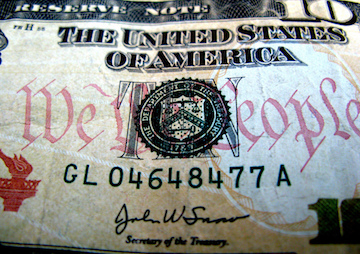New Rule Would Allow People to Sue Banks
The Consumer Financial Protection Bureau wants to return to consumers the right to bring class-action lawsuits against financial institutions, and the banks are not pleased. frankieleon / CC-BY-2.0
frankieleon / CC-BY-2.0
The Consumer Financial Protection Bureau has proposed a new rule that would return to consumers the right to bring class-action lawsuits against financial institutions, and the banks are not pleased.
At present, the small print in commercial contracts prevents many consumers from suing companies with which they do business, requiring them instead to submit to a process known as arbitration.
If granted, the rule could be a major victory for the agency, which was founded in large part by Sen. Elizabeth Warren, D-Mass.
The American Chamber of Commerce hovered on the edge of apoplexy in its response to the CFPB’s announcement of the proposed new rule. The agency “is proposing to give the biggest gift to plaintiffs’ lawyers in a half century – at the expense of the consumers the agency is charged with protecting,” the business group said in a statement.
Arbitration may be efficient, but it’s costly for consumers – especially for those concerned about precisely the kind of small fees that can put immense pressure on already struggling families.
It also can be a process that, while efficient, is far from equitable or just. A 2011 supreme court ruling opened the way for many companies to insist that their consumers or employees sign away their right to sue in favor of arbitration clauses. People who might have banded together as plaintiffs in a class-action lawsuit – sharing the costs of fighting a large corporation or finding a lawyer willing to shoulder those costs in hopes of a share of a payout on behalf of thousands of plaintiffs, not just a single individual – must act individually in arbitration.
A team of New York Times reporters last year pointed out the abuses inherent in this system, which they described as amounting to a “privatization of the justice system”, in a series of articles that were finalists for this year’s Pulitzer Prize for investigative reporting. Among the cases they documented were a woman working aboard a cruise ship, who, after alleging that two fellow employees had drugged her, raped her and left her unconscious in her cabin, discovered that she couldn’t sue her employer for permitting an unsafe workplace to occur.
There are myriad ways in which arbitration doesn’t measure up to the kind of recourse that you can seek in a court, if you feel that your bank or credit card company has taken advantage of you, sought to mis-sell you a product from a mutual fund to a mortgage, that isn’t in your interests, or simply overcharged you. First of all, any lawyer could hear your case (not necessarily a judge), and that lawyer could have done work (or still be working) for JP Morgan Chase or American Express while deciding your case. There’s no way to appeal the outcome – remember, this is binding arbitration. The bank that you’re up against gets to pay witnesses to testify on their behalf and can order its own employees to do the same. Little or none of that would be acceptable in a court of law.
—Posted by Alexander Reed Kelly.
Your support matters…Independent journalism is under threat and overshadowed by heavily funded mainstream media.
You can help level the playing field. Become a member.
Your tax-deductible contribution keeps us digging beneath the headlines to give you thought-provoking, investigative reporting and analysis that unearths what's really happening- without compromise.
Give today to support our courageous, independent journalists.









You need to be a supporter to comment.
There are currently no responses to this article.
Be the first to respond.